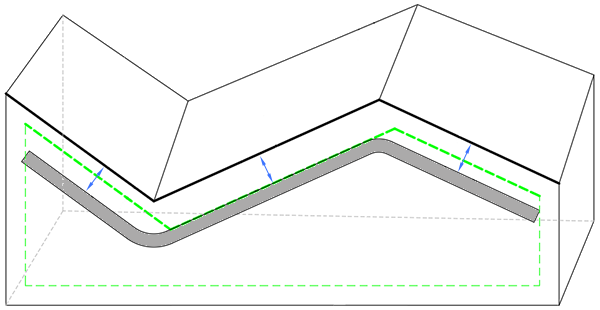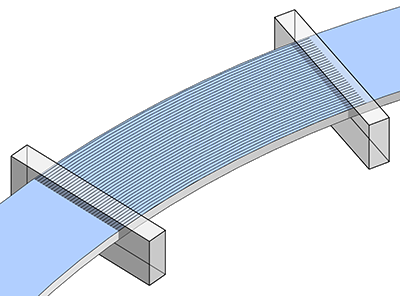Free form rebar populates the surfaces of irregularly shaped hosts with variable non-planar distribution.
You place free form rebar by specifying the reference surfaces along the host, a rebar set layout, and defining rebar properties. It populates any planar or complex 3D structural element. There are a few differences between free form rebar and shape-driven rebar when detailing your model. Free form rebar behaves differently in certain situations to maintain parametric fidelity and the geometry of the model.
Free form rebar is part of the Structural Rebar category, and possesses all of the associated properties. Create either single bars or sets with common rebar attributes such as hooks, quantities, bar lengths, total bar lengths, and automatic numbering. Likewise, you can add free form rebar to assemblies and groups.
Valid free form rebar hosts
Just like shape driven rebar, you can place free form rebar in any Revit element that can host rebar. Any face selected as a reference for defining the set or adjusting the bar ends must belong to an element that can host rebar. Multiple faces can be selected, however, the host faces must share the same structural element.
Rebar cover

When you specify the Style property of free form rebar to Stirrup/Tie, you can change the Stirrup/Tie Attachment For the Stirrup/Tie value of the Style parameter, the free form bar can be attached to either the inside or the outside of the concrete cover, depending of the setting of the Stirrup/Tie Attachment parameter.
Constraints
Free form rebar constraints set and lock the geometry of each rebar instance with respect to its defining references and the concrete host element. As in rebar cover offsets, free form rebar derives its geometry from the intersection of the specified reference faces and reacts to changes of those references.
Directly editing free form rebar instances and rebar sets removes constraints to the host. This includes copying, moving, rotating or mirroring rebar as well as adding the bars to assemblies and groups. Rebar that loses constraints no longer responds to changes in the geometry of the structural element.
 , while shortening occurs along the curve
, while shortening occurs along the curve
 .
.


Surface Distribution
 and the host surface
and the host surface
 places the first bar. Next, the intersection of the end
places the first bar. Next, the intersection of the end
 surface and the host surface places the second bar. Finally, the remaining bars (as specified in the rebar set layout) interpolate
surface and the host surface places the second bar. Finally, the remaining bars (as specified in the rebar set layout) interpolate
 between the first
between the first
 and last
and last
 bars.
bars.

Shape Matching
Rebar shape matching is currently unavailable for free form rebar. Free form rebar instances are shape 00 with Workshop Instructions parameters specified as Keep Straight.
Annotation
You can place rebar tags and annotation on individual instances of free form rebar however, placing multi-rebar annotation on free form rebar is not currently supported.
Couplers
You can connect free form rebar with rebar couplers. End treatments will also apply to the rebar ends in the coupler connection. Modifications done to the rebar will prompt the deletion of couplers, and no changes between the connected sets are propagated. Be sure free form rebar placement is complete or the couplers will need to be reapplied to the rebar.